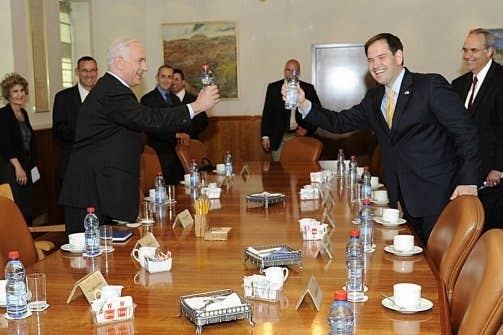
WASHINGTON — American politicians used to establish their foreign policy credentials with, well, accomplishments: Service abroad; policymaking; years of study.
But for politicians aiming to become foreign policy heavyweights in a hurry these days, there's shorter route: A single trip to the Middle East, followed by a round of speeches or panels back in Washington.
The model for this new route is, perhaps, President Barack Obama, visited the Middle East in a high-profile voyage as a senator. The latest examples are likely 2016 hopefuls Marco Rubio and Rand Paul, both of whom embarked on mirror-image trips to Israel and Jordan this winter, followed by a speech at the Heritage Foundation about the true meaning of conservative foreign policy (for Paul) and a Q&A session at the Washington Institute for Near East Policy (for Rubio). Mitt Romney went to the U.K., Poland, and Israel during his presidential run, and Chris Christie even visited Israel last year. It's an approach designed for maximum impact in an era where outings can be documented in real time and a single photograph can go viral and define a trip.
Travel-as-experience is "a real trend, and I actually think this one is a net positive," said Jonathan Prince, a former State Department official in the Clinton and Obama administrations. "What's better preparation for being President of the United States, 20 years in congressional committee hearings, or five trips to the most important region in the world for American security? It's not even a close call to me."
"I'd much rather have someone who's had meetings with Israeli prime minister, the Palestinian leaders, and other leaders like that than someone who's just talked about them in Washington," Prince said.
But veterans of foreign policy aren't all so sanguine about the junket version of foreign policy experience. Older politicians learned the ropes the old-fashioned way, and some were primed for a career in foreign policy by their personal history.
"In the case of McCain and Jack Kennedy and Kerry, the three of them all served. They all were involved in combat situations. They were raised as internationalists," said Aaron David Miller, a former State Department official and a fellow at the Woodrow Wilson Center in Washington, D.C.

"You know when someone is bullshitting you and when they're not," Miller continued. "Even though I don't agree with McCain on policy issues I do respect his knowledge on foreign policy."
Rubio and Paul, whose father Ron Paul is something of an outlier in his party on foreign policy, "don't have that background," Miller said. "At best in part these trips offer a way to compensate. People know, they get a sense of whether or not you know your stuff or whether you're faking it."
Still, Miller agreed with Prince that the new, more new media-friendly approach works — and that it's just an updated version of the kinds of staged events politicians have always held.
"All of this is politically motivated, that's the sine qua non of being viable in American politics," Miller said. "You see this all the time. There's a sense that you cannot be president without grounding yourself in certain relationships."
And even veteran diplomats say that, whatever the symbolic goals, they'd rather politicians travel than that they stay home.
"I think it's quite useful," said former U.S. Ambassador to the United Nations Thomas Pickering. "The most important thing for them is to travel to a variety of places. I think the beginning is to be able to say something useful and legitimate about what's going on, and my feeling is that is what they learn on these trips."
"I think politics haven't changed that much in 25 years," Pickering said. "All the old tricks haven't changed."
At this point, the relationship-building expedition to visit U.S. allies, especially Israel, is more or less expected of people with presidential ambitions.
But "sometimes the craven and the creditworthy are the same," Prince said. "Just because people expect it and you have to check the box doesn't mean it's not good to do."
